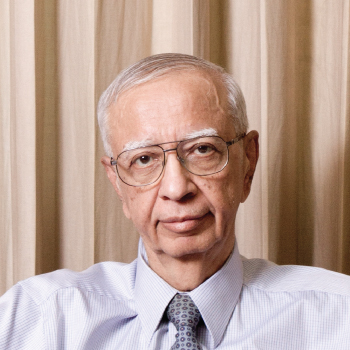
From left: Worawan Chandoevwit, social security adviser, Somchai Jitsuchon, research director of inclusive development, and Ammar Siamwalla, distinguished scholar, join a press conference yesterday on the TDRI
The Thailand Development Research Institute said government involvement was imperative for reducing social inequality, and it proposed structural reform of the public spending process for a fairer redistribution of government revenue.
This independent committee, which would not be part of the Finance Ministry, should consist of grass-roots and middle-income citizens, and they should have a major role in ensuring that the people have a voice in social and economic policies through methods such as primary voting.
Somchai suggested that a basic social-welfare bill should also be drafted to ensure that all people could receive welfare. The way to finance this would be to stop the use of all populist policies and the imposition of progressive taxes, such as increased heritage and capital-gains taxes.
He also suggested that at least half of the public budget should be invested in human capital such as education and welfare to increase social opportunities for the poor.
Direk Patmasiriwat of the Research Centre of the National Institute of Development Administration agreed that a board or committee should be set up to oversee government spending and suggested a platform similar to Australia’s Parliamentary Budget Office.
“This country’s budgeting system is ancient and in real need of reform,” Direk said.
Worawan Chandoevwit, social security adviser at the TDRI, said the government should combat Thais’ feeling of unfairness by decreasing the income of the rich and redistributing it to help the poor through welfare policy.
“Everyone should have equal access to education and social welfare in order for them to feel that they have been treated fairly by the government,” Worawan said.
One solution would be an end to classification through the use of social welfare cards, while people should be able to pay to get better service under the universal healthcare coverage policy.
She also recommended that people start saving for pensions by themselves and not depend only on help from the government, to lessen the problem of an ageing society.
Viroj NaRanong, research director of health economics and agriculture at the TDRI, said Thailand had a problem of structural inequality between the poor and the rich and, more specifically, between people inside and outside the agriculture sector. Farmers account for 25-40 per cent of the workforce but their incomes account for only 3-7 per cent of gross domestic product.
Viroj said the government should discourage people from returning to the agriculture sector through populist policies such as the rice-pledging scheme because that will increase the cost of production and land rental because of the increase in demand.
He also said that if he government decided to abandoned the scheme, the farmers would be affected even more because the cost of the production would remain high and it would be hard to lower it.
____________________________
First published: The Nation, February 18, 2014



